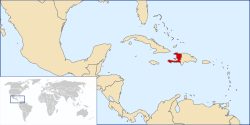
Back إمبراطورية هايتي الثانية Arabic Druhé Haitské císařství Czech Kaiserreich Haiti (1849–1859) German Segundo Imperio de Haití Spanish Second Empire d'Haïti French Հայիթիի երկրորդ կայսրություն Armenian Kekaisaran Haiti Kedua ID Duesma imperio Haitiana IO Secondo Impero di Haiti Italian ハイチ帝国 (1849年-1859年) Japanese
Empire of Haiti | |||||||||
|---|---|---|---|---|---|---|---|---|---|
| 1849–1859 | |||||||||
| Motto: Dieu, Ma Patrie Et Mon Épée (French) "God, my fatherland and my sword" | |||||||||
 The Empire of Haiti | |||||||||
| Capital | Port-au-Prince | ||||||||
| Common languages | French, Haitian Creole | ||||||||
| Religion | Roman Catholicism | ||||||||
| Government | Unitary absolute monarchy | ||||||||
| Emperor | |||||||||
• 1849–1859 | Faustin I | ||||||||
| Legislature | Parliament | ||||||||
• Upper Chamber | Senate | ||||||||
• Lower Chamber | Chamber of Deputies | ||||||||
| Historical era | 19th century | ||||||||
• Proclamation of Faustin Soulouque as Emperor Faustin I | 26 August 1849 | ||||||||
• Republic proclaimed | 15 January 1859 | ||||||||
| ISO 3166 code | HT | ||||||||
| |||||||||
The Second Empire of Haiti, officially known as the Empire of Haiti (French: Empire d'Haïti, Haitian Creole: Anpi an Ayiti), was a state which existed from 1849 to 1859. It was established by the then-President, former Lieutenant General and Supreme Commander of the Presidential Guards under President Riché, Faustin Soulouque,[1] who, inspired by Napoleon, declared himself Emperor Faustin I on 26 August 1849 at the Cathedral of Our Lady of the Assumption in Port-au-Prince.[2]
Faustin's unsuccessful invasions (in part due to the diplomatic interference of the United States and Spain)[3] in an attempt to reconquer the Dominican Republic (in 1849, 1850, 1855 and 1856), which had declared independence from Haiti in 1844, undermined his control over the country.
In 1858, a revolution began, led by General Fabre Geffrard, Duke of Tabara. In December of that year, Geffrard defeated the Imperial Army and seized control of most of the country. As a result, the Emperor abdicated his throne on 15 January 1859. Refused aid by the French Legation, Faustin was taken into exile aboard a British warship on 22 January 1859. General Geffrard succeeded him as President. Soon afterwards, the Emperor and his family arrived in Kingston, Jamaica, where they remained for several years. Allowed to return to Haiti, Faustin died at Petit-Goâve on 6 August 1867 and was buried at Fort Soulouque.[4]
- ^ The impact of the Haitian Revolution in the Atlantic world. David Patrick Geggus (ed), p. 25. University of South Carolina Press, 2001. ISBN 978-1-57003-416-9.
- ^ Davis, H. P. Black Democracy – The Story of Haiti, Read Books, 2008, p. 161. ISBN 978-1-4437-2849-2.
- ^ Baur, John E. (1949). "Faustin Soulouque, Emperor of Haiti His Character and His Reign". The Americas. 6 (2): 131–166. doi:10.2307/978436. JSTOR 978436. S2CID 210429049.
- ^ Rogozinski, Jan (1999). A Brief History of the Caribbean (Revised ed.). New York: Facts on File, Inc. pp. 220. ISBN 0-8160-3811-2.
© MMXXIII Rich X Search. We shall prevail. All rights reserved. Rich X Search

